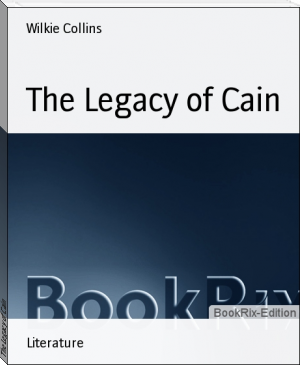author - "Wilkie Collins"

his hand, the golden Papa has a letter; and after he has made his excuse for disturbing us in our Infernal Region with the common mortal Business of the house, he addresses himself to the three young Misses, and begins, as you English begin everything in this blessed world that you have to say, with a great O. 'O, my dears,' says the mighty merchant, 'I have got here a letter from my friend, Mr.----'(the name has slipped out of my mind; but no matter; we shall come back to that; yes, yes--right-all-right). So the Papa says, 'I have got a letter from my friend, the Mister; and he wants a recommend from me, of a drawing-master, to go down to his house in the country.' My-soul-bless-my-soul! when I heard the golden Papa say those words, if I had been big enough to reach up to him, I should have put my arms round his neck, and pressed him to my bosom in a long and grateful hug! As it was, I only bounced upon my chair. My seat was on thorns, and my soul was on fire to speak but I held my tongue, and let Papa go...

Description
Man and Wife is the ninth novel by Wilkie Collins, and was published in serial form in 1870. Like many of his other novels it has a complex plot and tackles social issues, in this case the then-lax state of the marriage laws, particularly in Scotland and Ireland. As always, Collins deals carefully but frankly with human personal behavior. To avoid offending Victorian morals too greatly, much is implied rather than stated outright. Nevertheless, even dealing with such matters at all led to his novels being derided as “sensation fiction” by his critics. By today’s standards, of course, they wouldn’t even raise an eyebrow.
In Man and Wife, the main character Anne Silvester has fallen pregnant to a muscular and handsome, but boorish man, Geoffrey Delamayn, to whom she is not married. She is working as a governess at a house in Scotland. Anne arranges to meet Delamayn secretly at a garden party and angrily demands that he fulfill his promise to marry her, that very day. He very reluctantly agrees to a secret, private marriage, knowing that a public marriage would badly affect his inheritance prospects. How is the marriage to be arranged quickly but kept quiet? Anne has a plan based on her understanding of the looseness of the marriage laws in Scotland. Naturally, of course, things go badly wrong with this plan and many complexities arise.
Collins is deeply critical of the state of contemporary marriage laws, both in how loosely they were framed, and in how little power over their own lives they gave to women once they were married, even if married to a brutal man. He also uses this novel to denounce the worship of sporting heroes and the obsession with physical prowess rather than mental superiority as a primary indication of male virtue.
Though not as popular as his novels The Woman in White and The Moonstone, Man and Wife received a good critical reception when it was released and was a commercial success.

Description
The “Moonstone” of the title is a large but flawed diamond, looted from India at the time of the Mutiny by an unscrupulous British officer. Many years later, estranged from his family due to his licentious lifestyle, the officer bequeaths the diamond to his sister’s daughter, Rachel Verrinder, to be given to her on her 18th birthday. Due to the ill-omens surrounding the gem, this may have been an act of revenge rather than reconciliation. The diamond, it appears, was taken from a statue of the Moon God worshipped by a Hindu cult, and it has long been sought by a group of Brahmins determined to return it to their temple.
On the night of the birthday party the gem mysteriously disappears from Rachel’s room. While the first suspicions naturally fall on these Indians, they are eventually exculpated. Rachel becomes hysterical and angry when questioned about the theft and refuses to assist the police. Active efforts to assist them are taken up by Rachel’s cousin (and sweetheart) Franklin Blake. These efforts simply drive Rachel into further fury, and she becomes completely estranged from him. Suspicion thus falls on her as having some secret reason for wishing to raise money on the diamond. The novel proceeds to slowly uncover the mysteries involved.
Published in 1868, The Moonstone is often considered as one of the precursors of the modern detective novel, though this is a label which would not have been used by its author Wilkie Collins and his contemporaries. While it is true that the plot revolves around the mystery of a theft, and that it features Sergeant Cuff “in the Detective Force of Scotland Yard,” the novel is much more about character and relationships than the mere revelation of secrets. It also has a good dose of Collins’ humour, as the story is told in large part by eccentric characters such as the old house-steward Gabriel Betteredge who regards Robinson Crusoe as an oracle; and the ultra-religious Miss Clack, determined to convert everyone to her views.
Immensely popular at the time of its publication in serial form, The Moonstone is rightly considered to be one of Collins’ best works, and remains highly regarded today.

his hand, the golden Papa has a letter; and after he has made his excuse for disturbing us in our Infernal Region with the common mortal Business of the house, he addresses himself to the three young Misses, and begins, as you English begin everything in this blessed world that you have to say, with a great O. 'O, my dears,' says the mighty merchant, 'I have got here a letter from my friend, Mr.----'(the name has slipped out of my mind; but no matter; we shall come back to that; yes, yes--right-all-right). So the Papa says, 'I have got a letter from my friend, the Mister; and he wants a recommend from me, of a drawing-master, to go down to his house in the country.' My-soul-bless-my-soul! when I heard the golden Papa say those words, if I had been big enough to reach up to him, I should have put my arms round his neck, and pressed him to my bosom in a long and grateful hug! As it was, I only bounced upon my chair. My seat was on thorns, and my soul was on fire to speak but I held my tongue, and let Papa go...

Description
Man and Wife is the ninth novel by Wilkie Collins, and was published in serial form in 1870. Like many of his other novels it has a complex plot and tackles social issues, in this case the then-lax state of the marriage laws, particularly in Scotland and Ireland. As always, Collins deals carefully but frankly with human personal behavior. To avoid offending Victorian morals too greatly, much is implied rather than stated outright. Nevertheless, even dealing with such matters at all led to his novels being derided as “sensation fiction” by his critics. By today’s standards, of course, they wouldn’t even raise an eyebrow.
In Man and Wife, the main character Anne Silvester has fallen pregnant to a muscular and handsome, but boorish man, Geoffrey Delamayn, to whom she is not married. She is working as a governess at a house in Scotland. Anne arranges to meet Delamayn secretly at a garden party and angrily demands that he fulfill his promise to marry her, that very day. He very reluctantly agrees to a secret, private marriage, knowing that a public marriage would badly affect his inheritance prospects. How is the marriage to be arranged quickly but kept quiet? Anne has a plan based on her understanding of the looseness of the marriage laws in Scotland. Naturally, of course, things go badly wrong with this plan and many complexities arise.
Collins is deeply critical of the state of contemporary marriage laws, both in how loosely they were framed, and in how little power over their own lives they gave to women once they were married, even if married to a brutal man. He also uses this novel to denounce the worship of sporting heroes and the obsession with physical prowess rather than mental superiority as a primary indication of male virtue.
Though not as popular as his novels The Woman in White and The Moonstone, Man and Wife received a good critical reception when it was released and was a commercial success.

Description
The “Moonstone” of the title is a large but flawed diamond, looted from India at the time of the Mutiny by an unscrupulous British officer. Many years later, estranged from his family due to his licentious lifestyle, the officer bequeaths the diamond to his sister’s daughter, Rachel Verrinder, to be given to her on her 18th birthday. Due to the ill-omens surrounding the gem, this may have been an act of revenge rather than reconciliation. The diamond, it appears, was taken from a statue of the Moon God worshipped by a Hindu cult, and it has long been sought by a group of Brahmins determined to return it to their temple.
On the night of the birthday party the gem mysteriously disappears from Rachel’s room. While the first suspicions naturally fall on these Indians, they are eventually exculpated. Rachel becomes hysterical and angry when questioned about the theft and refuses to assist the police. Active efforts to assist them are taken up by Rachel’s cousin (and sweetheart) Franklin Blake. These efforts simply drive Rachel into further fury, and she becomes completely estranged from him. Suspicion thus falls on her as having some secret reason for wishing to raise money on the diamond. The novel proceeds to slowly uncover the mysteries involved.
Published in 1868, The Moonstone is often considered as one of the precursors of the modern detective novel, though this is a label which would not have been used by its author Wilkie Collins and his contemporaries. While it is true that the plot revolves around the mystery of a theft, and that it features Sergeant Cuff “in the Detective Force of Scotland Yard,” the novel is much more about character and relationships than the mere revelation of secrets. It also has a good dose of Collins’ humour, as the story is told in large part by eccentric characters such as the old house-steward Gabriel Betteredge who regards Robinson Crusoe as an oracle; and the ultra-religious Miss Clack, determined to convert everyone to her views.
Immensely popular at the time of its publication in serial form, The Moonstone is rightly considered to be one of Collins’ best works, and remains highly regarded today.






